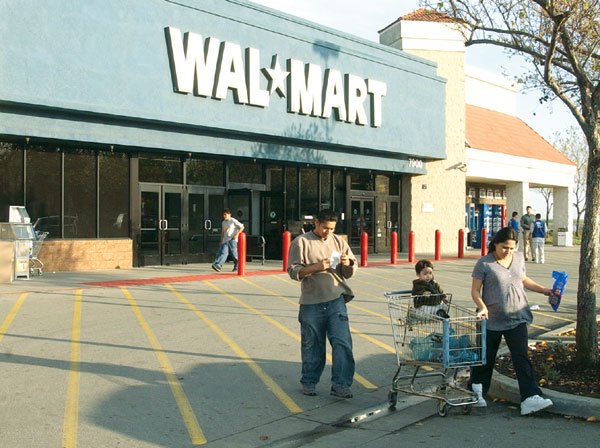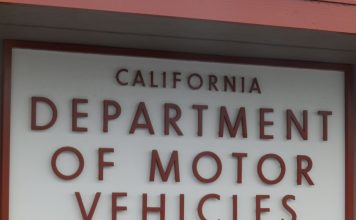GILROY
– The Wal-Mart corporation passed its first hurdle Thursday
toward bringing a super-sized version of its store to Gilroy.
GILROY – The Wal-Mart corporation passed its first hurdle Thursday toward bringing a super-sized version of its store to Gilroy.
At a jam-packed and emotional public hearing in City Hall, Gilroy’s Planning Commission voted 6-1 in support of plans to build a 220,000-square-foot Wal-Mart Supercenter in the new Pacheco Pass Center east of U.S. 101.
The Planning Commission – City Council’s premier land use advisory panel – heard testimony from more than 30 citizens, all of them with a strong and sometimes emotional pro- or anti-Wal-Mart bent. Contrary statistics, accusations of being anti-worker or anti-capitalist and even tears were the order of the day during the roughly three-hour-long Thursday night hearing.
“For me, it’s just about saving money,” Gilroy resident Cindy Owens told the Planning Commission. “I’m just a shopper with a child and family to buy for. I’m not a Wal-Mart employee, I’m not a union worker, I just want to save money. Go Wal-Mart!”
The project is now cleared to go before a business-friendly City Council Feb. 17. Wal-Mart wants to open the store in the first quarter of 2005.
Planning Commission member Cat Tucker was the lone dissenter.
“I’m not comfortable to say it’s OK to have air quality impacts,” Tucker said. “I won’t support it.”
Due to increased traffic, the Supercenter – like many other large stores in the area – would add toxins to the air that exceed regional standards.
Tucker also was swayed by, perhaps the most derisive issue Thursday night, citizens’ concerns over the economic impacts of a Supercenter.
Tucker told Wal-Mart representatives they should have done an economic impact report on the project even though City Council said they did not have to.
“It would have been a good faith effort,” Tucker said.
An economic impact report for the site does exist. However, it is from 1992 and only specifies that retail stores will go into the area. The study does not look at the particular impact a Wal-Mart Supercenter would have.
Wal-Mart opponents liken Supercenters to an A-bomb for other grocery chains. Opponents claimed Thursday night that Wal-Mart Supercenters use predatory pricing, underpay their workers, provide scant benefits and rely on overseas slave labor to keep prices always low.
Wal-Mart advocates say the claims are union-inspired concoctions. And several Gilroy Wal-Mart managers and clerks spoke favorably of the store, its wages and its benefits package Thursday.
Wal-Mart Supercenters offer full-scale grocery options in addition to the store’s regular discount buys.
The prospect of a Supercenter grocery store in Gilroy drew supermarket employees from across town and the Bay Area into a political fray that got heated before the November elections and figures to stay that way at least until Feb. 17.
From labor union executives and unionized cashiers who make $19 an hour to longtime mom-and-pop grocery store owners, citizens testified that competition from a Wal-Mart Supercenter could put them out of business like it allegedly had to many businesses around the country.
“It’s very scary to know my parents’ business might close down just because a big corporation moves in,” said Edith Rodriguez, whose parents own Kachey Produce, a neighborhood produce stand on First Street.
“I might not (have the money to) finish college because of this,” a teary Rodriguez told the Planning Commission.
Wal-Mart’s effort to relocate from its Arroyo Circle store near the Gilroy Premium Outlets into a building more than twice its size next to the new big box retail stores has been peppered with disparate predictions on the local economy and workers’ quality of life.
Wal-Mart spokeswoman Amy Hill said 90 percent of the company’s employees have health benefits. The claim contradicted union representative Danny Beagle’s prior statement that 62 percent of Wal-Mart employees had no healthcare coverage.
Hill also contradicted claims that supermarkets die when Supercenters move in.
“Across the U.S., Supercenters coexist with other stores,” Hill said. In Nevada, “Raley’s, which owns Nob Hill, is building a new store one half mile from a Wal-Mart Supercenter.”
Allaying concerns that Wal-Mart’s relocation would leave an empty Arroyo Circle building in its wake, the company publicly announced last night it had entered into a contract to sell its existing building.
If the retail giant were allowed to move, it would sell the 148,000-square-foot site to Hudson Jones Commercial Brokerage out of San Jose.
Company President Dan Hudson would not disclose the names of the future lease holders. However, Hudson said two businesses may occupy the site.
“It could be retail and/or entertainment related renters, but nothing is final yet,” Hudson said Thursday. “We’re waiting to see how things go tonight.”













